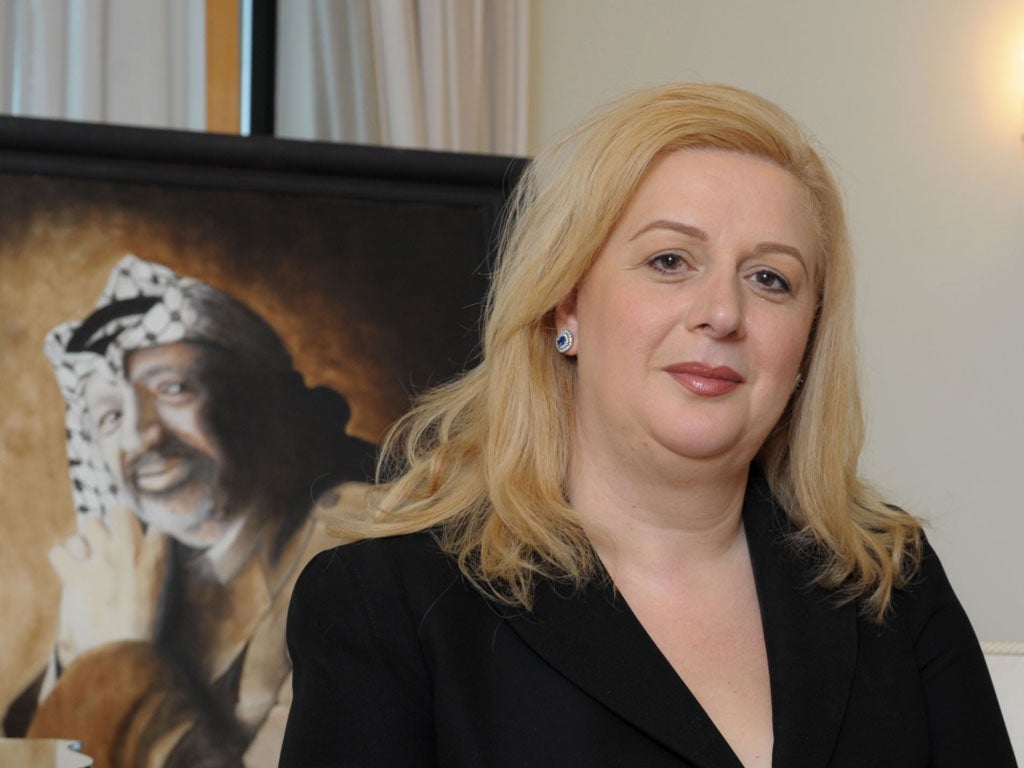Arafat's widow considers role in politics to 'continue legacy'
Suha Arafat says Palestinians miss the democratic rule implemented by her husband

Your support helps us to tell the story
From reproductive rights to climate change to Big Tech, The Independent is on the ground when the story is developing. Whether it's investigating the financials of Elon Musk's pro-Trump PAC or producing our latest documentary, 'The A Word', which shines a light on the American women fighting for reproductive rights, we know how important it is to parse out the facts from the messaging.
At such a critical moment in US history, we need reporters on the ground. Your donation allows us to keep sending journalists to speak to both sides of the story.
The Independent is trusted by Americans across the entire political spectrum. And unlike many other quality news outlets, we choose not to lock Americans out of our reporting and analysis with paywalls. We believe quality journalism should be available to everyone, paid for by those who can afford it.
Your support makes all the difference.The widow of the late Yasser Arafat has said the resistance leader sacrificed their marriage and a relationship with the couple's only daughter for the Palestinian cause.
In a rare interview with CNN, Suha Arafat shed light on the difficulties of being married to a man she described as the "Nelson Mandela of the Arab world", and said he pushed her away to focus on achieving an independent state.
"Everyone was saying: 'She left him'," Mrs Arafat told CNN's Connect the World show. "I had to leave because he obliged me to leave him because he said: 'I am becoming the new revolutionary again'." He paid for the cause, she said, "with his life". "He did not see his daughter. He told us to go out because he did not want us to stay in Palestine."
Educated in a Catholic convent near Jerusalem and later at the Sorbonne in Paris, the blonde-haired Christian Arab was an unlikely match for the hardened resistance leader, whom she met in Paris through her work for the exiled Palestine Liberation Organisation, which he led.
The couple married secretly – she was just 27, and he was 61 – in 1990 and had a daughter, Zahwa, five years later. She was never at ease in what she described as the "man's world" of Palestinian politics. "It was very closed," she once said, "like a family with a lot of intermarriages, and, well, you know the result of that."
After Arafat became Palestinian president in 1994, she lived for a few years in the Palestinian territories before leaving for Paris, where she waited out the Second Intifada, the Palestinian uprising that began in 2000. Yasser Arafat died in Paris in November 2004.
Mrs Arafat wants to continue her husband's legacy, arguing that he was a freedom fighter with a conscience. "I have been saying that maybe after Zahwa gets married... I might go into politics because Yasser Arafat has to have a continuity," she said. "I see the Arab spring, and how the people are getting rid of their leaders... yet still now the people cry for the loss of Arafat, the democracy that Arafat brought." But it remains far from clear if her political ambitions will be welcomed by those she would want to represent. She remains a divisive figure in Palestinian circles, reviled for her efforts to break up the coterie that surrounded her spouse, and accused of stealing public money to support a lavish lifestyle, corruption allegations that also tarnished the legacy of her husband.
Lately, she has also come under scrutiny for her once-close ties to the wife of the ousted Tunisian dictator. Her Tunisian citizenship was revoked in 2007 following an alleged spat with First Lady Leila Ben Ali, loathed by many Tunisians as a symbol of the ruling family's excesses. Mrs Arafat has since been accused of corruption by the Tunisian authorities, and an international warrant has been issued for her arrest.
But it is her reputation during her husband's final days that Mrs Arafat most wants to shed. She drew ire for her efforts to keep his closest advisers away from his deathbed, accusing them of trying to "bury Arafat while he is still alive", and opened herself to ridicule with her efforts to appoint a successor as Arafat lay dying. "After the [Second] Intifada, Yasser and myself were portrayed as devils," she said. "I was portrayed as the Marie Antoinette of the Arab world."
Join our commenting forum
Join thought-provoking conversations, follow other Independent readers and see their replies
Comments